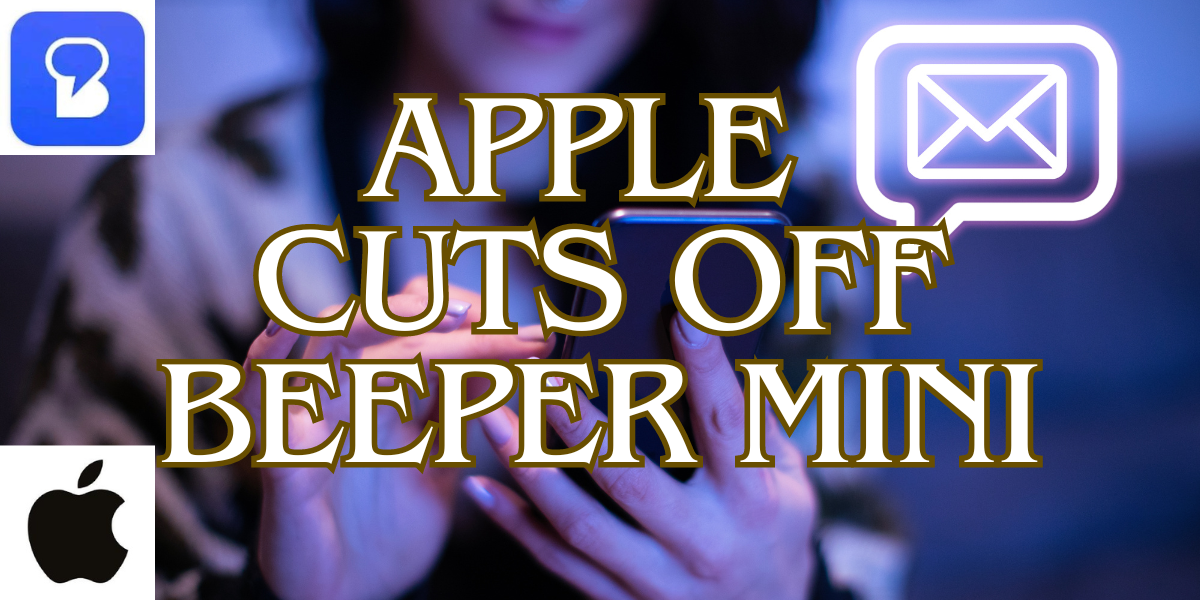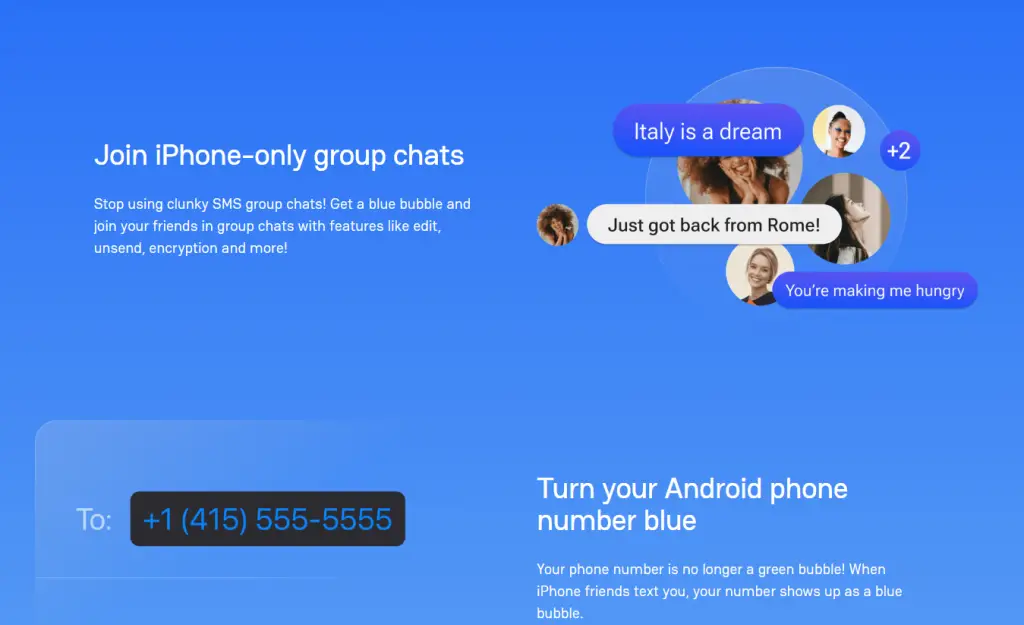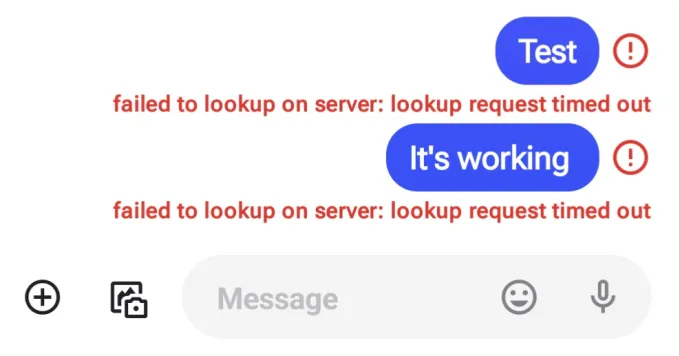Apple Cuts off Beeper Mini: The End of iMessage for Android Users

In the rapidly evolving landscape of digital communication, the recent decision by Apple to cut off Beeper Mini’s access to iMessage has become a focal point of discussion, highlighting the complex interplay between technological innovation and the control exerted by tech giants. Beeper Mini, an AI tool designed to bridge the messaging gap between Android and iOS users, represented a significant step forward in cross-platform communication. However, Apple’s move to restrict its access raises critical questions about the balance of power in the tech industry, the ethical considerations of digital rights, and the legal implications of such decisions.
Apple’s decision to restrict Beeper Mini’s access to iMessage has ignited debates on innovation, user rights, and tech industry dynamics. This move impacts not just Beeper Mini but also reflects on broader issues of digital rights and industry practices.
Table of Contents
What is Beeper Mini?
Beeper Mini emerged as an innovative application designed to bridge the communication gap between Android and iOS users. It was a standalone Android app that allowed Android users to access Apple’s iMessage service, which was previously exclusive to Apple devices. The app’s primary function was to enable Android users to send and receive iMessages, effectively integrating them into the Apple messaging ecosystem. This integration was a significant breakthrough, as it allowed for seamless communication between users of the two different platforms, overcoming a longstanding barrier in mobile communication.
The app’s functionality extended beyond just sending and receiving text messages. Beeper Mini allowed Android users to participate in iMessage group chats, share high-resolution photos and videos, and access various iMessage-specific features like emoji reactions, typing indicators, and read receipts. These features were particularly appealing to Android users who had limited interaction capabilities with friends or family using iPhones. The app’s ability to provide these features without requiring a connected Mac or iPhone set it apart from other third-party messaging solutions.
Security and privacy were also focal points of Beeper Mini’s design. The app boasted end-to-end encryption for messages, ensuring that communication remained secure and private. This level of security was crucial, considering the sensitive nature of personal messages. Beeper Mini’s commitment to privacy and security, combined with its ability to seamlessly integrate Android users into the iMessage environment, made it a unique and valuable tool in the world of mobile communication.
Also read:Apple Watch Series 9: Faster Performance and Exciting Features
Apple cuts off Beeper Mini’s access to iMessage
In a significant move, Apple Inc. decided to cut off Beeper Mini’s access to iMessage, effectively disrupting the service that had enabled Android users to utilize iMessage. This decision came as a response to Beeper Mini’s method of integrating Android devices into the iMessage network, which Apple deemed a violation of its security protocols. Apple’s primary concern was the exploitation of fake credentials by Beeper Mini to gain access to iMessage, which they argued posed significant risks to user security and privacy. This included potential threats like metadata exposure, enabling unwanted messages, spam, and phishing attacks. Apple’s action to block Beeper Mini was seen as a protective measure for its ecosystem, emphasizing the company’s ongoing commitment to safeguarding user data and maintaining the integrity of its services.
The impact of Apple’s decision was immediate and significant. Beeper Mini users on Android found themselves unable to send messages through the app, encountering error messages and disrupted service. This development not only affected the functionality of Beeper Mini but also raised broader questions about interoperability between different operating systems and the extent of control tech giants have over their ecosystems. For many users and observers, this move highlighted the ongoing struggle between maintaining security and offering flexibility in communication across platforms. While Apple stood firm on its stance to protect its users, the decision sparked a debate about the balance between security and open communication in the digital age, especially in the context of proprietary versus third-party applications.

Functions of Beeper Mini
Beeper Mini emerged as a groundbreaking application, offering a suite of features that bridged the gap between Apple’s iMessage and Android devices. This section delves into the various functionalities of Beeper Mini, highlighting how it revolutionized messaging for Android users who wanted access to iMessage.
Seamless iMessage Integration on Android
- Blue Bubble Messaging: Enabled Android users to send and receive iMessage texts, typically exclusive to Apple devices.
- Group Chat Participation: Allowed joining of iPhone-only group chats, breaking the barrier between iOS and Android messaging.
- High-Quality Media Sharing: Supported sending and receiving high-resolution photos and videos, enhancing the overall messaging experience.
Enhanced Messaging Features
- Advanced Chat Options: Included features like message editing, unsending, and encryption, which were not standard in typical SMS or MMS services.
- Emoji Reactions and Voice Messages: Allowed users to send emoji reactions and voice messages, aligning with the rich communication features of iMessage.
- Typing Indicators and Read Receipts: Provided real-time typing indicators and read receipts, fostering a more interactive and engaging messaging experience.
User-Friendly Interface and Security
- Intuitive User Interface: Designed with a user-friendly interface, making it easy for Android users to navigate and utilize iMessage features.
- End-to-End Encryption: Ensured that messages were end-to-end encrypted, providing a secure communication channel.
- No Need for External Devices: Operated independently without the need for a connected Mac or iPhone, unlike other third-party messaging apps.
Beeper Mini Users' Reactions to Apple's Decision
Mixed Reactions from the Community
- Surprise and Disappointment: Many users expressed surprise and disappointment at Apple’s decision. Comments on Reddit and Hacker News reflected a sense of frustration, with users lamenting the loss of a service that bridged the iOS-Android communication gap.
- Criticism of Apple’s Ecosystem Control: Some users criticized Apple for maintaining a closed ecosystem, viewing the decision as a move to keep users locked into Apple’s products and services.
- Concerns About Future of Cross-Platform Communication: The decision raised concerns about the future of cross-platform communication, with users questioning whether such integration would ever be possible given the tight control companies like Apple have over their ecosystems.
User Comments and Perspectives
- Reddit User Comments: On Reddit, users like FitzKnows23 and SpicyPepperMaster discussed the inevitability of Apple’s action and speculated about the future of messaging, especially with the upcoming integration of RCS in iMessage.
- Hacker News Discussions: On Hacker News, users debated the implications of Apple’s decision for privacy and security in messaging platforms. Some, like cdata and zxt_tzx, criticized the reliance on vertically integrated corporations for privacy and security, while others like Grustaf questioned the security benefits of third-party clients.
Looking Ahead: Users’ Expectations and Hopes
- Hope for Alternatives: Despite the setback, some users remained hopeful for alternative solutions or workarounds that could continue to provide cross-platform messaging capabilities.
- Skepticism About Beeper Mini’s Future: There was also a sense of skepticism about Beeper Mini’s ability to continue operating effectively, given Apple’s active measures to shut down the service.
- Debate Over Messaging Security and Privacy: The discussion extended to broader topics of messaging security and privacy, with users expressing diverse opinions on the best way to ensure secure and private communication across different platforms.

What does this mean for Beeper Mini's future?
Uncertain Path Ahead
- Challenges in Overcoming Apple’s Restrictions: Beeper Mini faces significant challenges in overcoming Apple’s strict control over its messaging ecosystem. With Apple actively blocking unauthorized access, Beeper Mini’s core functionality is at risk. The app’s future depends on its ability to navigate these restrictions without compromising user security and privacy.
- Potential for Innovative Workarounds: Despite the setback, there is potential for Beeper Mini to explore innovative workarounds. The team behind Beeper Mini could develop new methods to enable cross-platform messaging that comply with Apple’s guidelines, though this would require significant technical ingenuity and may still face resistance from Apple.
Impact on Cross-Platform Communication
- Setback for Android and iOS Integration: Apple’s decision represents a significant setback for efforts to integrate Android and iOS messaging platforms. It underscores the challenges third-party developers face in creating solutions that bridge the gap between these two dominant ecosystems.
- Raising Questions About Ecosystem Interoperability: The situation with Beeper Mini raises broader questions about the future of ecosystem interoperability. It highlights the need for more open standards in messaging that allow seamless communication across different platforms, a goal that seems increasingly difficult to achieve in the current tech landscape.
Broader Implications for Third-Party Apps
- Stricter Control by Tech Giants: Apple’s move could signal a trend towards stricter control by tech giants over their ecosystems, potentially limiting the scope for third-party apps to offer innovative services.
- Need for Regulatory and Industry Response: This situation may prompt a regulatory and industry response to address the balance between innovation and control in digital communication. It could lead to discussions about antitrust implications and the need for more open standards in technology, fostering a more competitive and user-friendly digital environment.
Tech Industry's Perspective on Apple's Decision to Cut Off Beeper Mini
Concerns About Ecosystem Lock-In
- Criticism of Closed Ecosystems: Within the tech industry, there’s a growing concern about the implications of Apple’s decision on the broader ecosystem. Many industry experts criticize the move as an example of ecosystem lock-in, where tech giants like Apple maintain strict control over their platforms. This control limits the ability of third-party developers to innovate and offer competitive services.
- Debate Over User Choice and Competition: The situation has sparked a debate about user choice and competition in the tech industry. Some argue that Apple’s decision stifles competition and innovation, as it prevents users from accessing potentially beneficial services like Beeper Mini. Others, however, support Apple’s right to protect its ecosystem and user privacy, highlighting the company’s responsibility to safeguard its platform from potential security risks.
Implications for Future App Development
- Challenges for Third-Party Developers: Apple’s action against Beeper Mini is seen as a warning to other third-party developers. It highlights the challenges and risks involved in developing apps that rely on accessing major platforms’ proprietary services. This situation could lead to increased caution among developers when creating apps that integrate with services like iMessage.
- Potential Shift in Development Strategies: The tech industry might witness a shift in development strategies, with more focus on creating standalone apps and services rather than relying on integration with existing platforms. This could lead to a diversification of the app market, encouraging innovation in areas not dominated by the major tech companies.

Legal and Ethical Considerations
Legal Implications
The legal implications of Apple’s decision to cut off Beeper Mini are complex and multifaceted. Legally, Apple’s move can be seen as an exercise of its rights to control and protect its proprietary software and services. However, this action raises questions about antitrust laws and the balance of power in the tech industry. It brings to the forefront the issue of whether dominant tech companies should have the authority to completely shut out third-party services that use their platforms, especially when these services provide significant benefits to users. The situation with Beeper Mini could potentially lead to legal scrutiny regarding monopolistic practices and the need for more open standards in technology. This case might encourage lawmakers and regulatory bodies to re-examine the current legal frameworks governing competition and innovation in the digital space, ensuring fair play and consumer choice.
Ethical Considerations
Ethically, Apple’s decision is a subject of intense debate. On one hand, Apple argues that its actions are in the interest of protecting user privacy and security, which are paramount in today’s digital age. From this perspective, Apple’s decision is a responsible measure to safeguard its users from potential security vulnerabilities. On the other hand, critics argue that this move undermines the principles of openness and interoperability in the tech ecosystem. It raises ethical concerns about user autonomy and the right to access diverse technological solutions. The ethical debate extends to the responsibility of tech giants in shaping the digital landscape and their role in either enabling or hindering technological progress and user empowerment. This situation highlights the need for ethical guidelines in technology development and deployment, ensuring that advancements are aligned with the broader interests of society and individual rights.
Conclusion
The decision by Apple to cut off Beeper Mini’s access to iMessage has sparked a multifaceted discussion, encompassing technological innovation, legal boundaries, and ethical considerations. This move not only affects Beeper Mini’s future but also raises broader questions about the dynamics of power in the tech industry, the balance between security and openness, and the rights of users in a digital ecosystem dominated by a few tech giants. While Apple’s stance is rooted in protecting its ecosystem and user privacy, it also highlights the challenges third-party developers face in a landscape where interoperability and user choice are often at odds with proprietary interests. The situation calls for a nuanced understanding of the legal and ethical implications of such decisions and underscores the need for ongoing dialogue and potential regulatory interventions to ensure a fair and innovative digital future.

